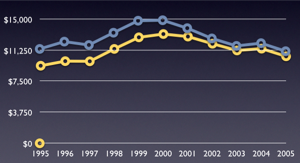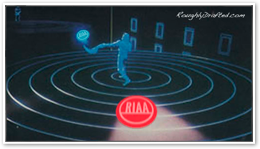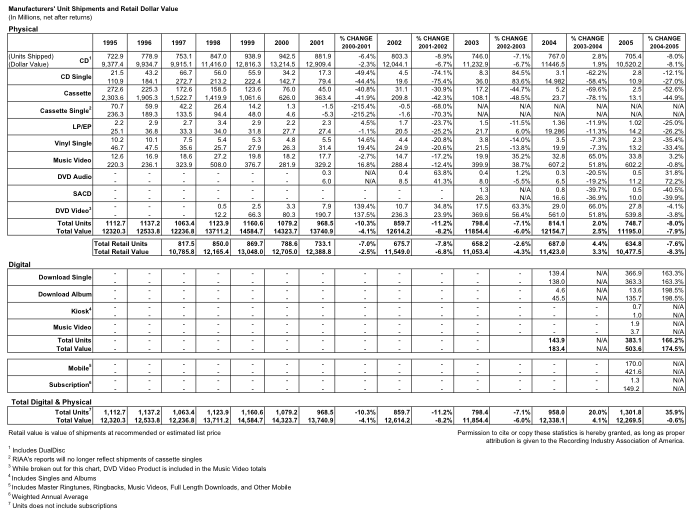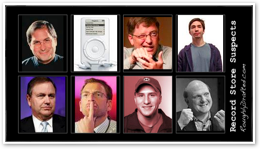

Is Piracy Really Killing the Music Industry?
Various music industry trade groups claim that piracy is killing their industry, and are suing file traders and the sites they use. Are music sales, revenue, and profits down? Are MP3 downloads preventing music sales or do they instead help advertise new music? Are paid music downloads profitable or are they still insignificant?
Let's Ask the RIAA
Unsurprisingly, the music industry's own research and opinions on the subject support the idea that unauthorized distribution of music is killing both sales growth and profits. The result: music costs more to produce, there's greater risk in signing smaller acts with uncertain audiences, and the lower sales volumes have forced the labels to raise the retail price of CDs.
From the label's perspectives, the only solutions are to:
-
•lock down music so users can't share the copies they buy
-
•prosecute file traders and win settlements against them to discourage the practice
-
•institute market pricing for music, so buyers pay more for popular music and less for back catalog music
Isn’t The Customer Always Right?
The RIAA has its critics, many of whom are music customers. Among them are:
-
•the free and open source software crowd, who like the idea of freely shared content
-
•people who don't want to pay for things that can be found for free, and don't like being sued
-
•people who don't want to be restricted in their use of purchased music
-
•companies who don't benefit from the market pricing of music
Before looking at the merits of the RIAA’s complaints and examining their own data on sales, take a look at the rationale presented by its various circles of critics, and see whose perspective best fits the facts.
Free as in Beer, Speech
Among the most effusive and articulate of critics are the minds who make up the volunteer collective of free and open source software. These people have spent a lot of time thinking about the nature of shared ideas and intellectual property, and some try to apply the principles proven to work in delivering shared, open code into the world of entertainment.
The difference, of course, is that free and open source software is written by volunteers. GNU/Linux, BSD, and other projects' code can be shared as desired by their creators.
The GPL and BSD style licenses seek to enforce different schools of thought on how content should be shared. However, neither can be applied to the commercial music represented by the labels, because none of that music is free or open.
Britney Spears' music is just as closed and proprietary as Microsoft Windows, and nobody has rights to distribute it under a free license, just as Microsoft has no rights to distribute Linux code without following the license provisions of the GPL.
Reasonable proponents of free and open content don't confuse unauthorized use of commercial music with "free content," and have instead sought to create their own music, movies and other entertainment, and share them under agreements like the Creative Commons licenses.
In their ideal world, there would be no DRM, no or at least few middleman labels selling their representation and marketing, and musicians and other performers would be supported by user donations, sponsoring companies, or perhaps sunshine and love.
Think of the Children
While many free and open source software proponents are intelligent, experienced, and affluent, there is an epidemic of poor and stupid people around the world. Many of them have been quarantined into higher education campuses in a social engineering experiment to educate them and make them valuable to society.
All that exposure to education and liberal thinking--considering facts and being willing to change their outlook based upon that new information--frequently results in more free and open source software proponents, with less attraction to music from Britney Spears and a greater interest in the work of smaller indie artists.
Along the way however, the problems of being poor and stupid commonly result in run-ins with authority. The RIAA is increasingly becoming a prime example of this; it has been targeting the poor and stupid to create fear, uncertainty, and doubt about the safety of trading files.
The RIAA mounted its legal attack just as sales of music to younger demographics appeared to collapsed in tandem with Internet file trading. However, things are not always as they appear, as the numbers indicate later.
The Scarcity Behind Supply and Demand
In trying to emulate their smarter and more experienced role models, the poor and stupid have tried to create economic arguments against the commercial existence of music.
A recent popular meme is to describe music as a "non-scarce good" and DRM as an artificial construct designed to convert music into a scarce good, one that can command a high price. This argument is absurd.
Music itself--as well as movies and other forms of entertaining, intellectual, and artistic performances--is most certainly a scarce good. It costs many thousands of dollars to produce an album, and millions to create movies.
That expense, related to not only the "above the line" performers, but also the "below the line" technicians involved in production, and expenses in advertising, promoting, and the various administrative costs, all make music and other productions very expensive projects. Expensive things are scarce.
If the resources to produce music were not scarce, there would be no American Idol or Star Search, and the planet would have 6 billion rock stars. Music is a scarce good. The fact that it can be mass duplicated after production finishes does not make it a non-scarce good. There are lots of ideas with clear and obvious value that are not tangible nor consumed:
-
•Currency is artificially scarce. Anti-counterfeiting measures are essentially a “DRM,” protecting the value of currency and propping up the economy.
-
•Apartment rentals invent artificial scarcity to exchange privacy for money. A landlord could shove a dozen other people in your apartment. By not sharing your space, value is created and rent rises.
-
•Consulting work is similarly based on the scarcity of an expert's time. If time and space knew no boundaries, we could all be experts in every field and solve each other’s problems for free.
Time and space are constrained however, as are raw materials, talent, and good ideas. All those constraints result in scarcity, which demands effort and expense to collect, expend, or consume. We vote on how to distribute scarce things with our money.
Counterfeiting vs Piracy
Arguments that “ideas” like music have no value because they can be duplicated are as fallacious as suggesting that a copy machine creates value when it counterfeits money. No, it doesn't.
Fraud might temporarily enrich the counterfeiter, but it steals from everyone else who has worked for their money, because a fraudulent supply of money devalues real money.
Counterfeiting is such a threat to the worlds' economies that governments enact harsh punishments for counterfeiters, invest in developing anti-counterfeiting methods, and carefully police their money supplies.
It is therefore no surprise that unauthorized copying of music is similarly viewed as a serious threat by those who benefit from a tight hold on its supply, or that they are interested in DRM as a mechanism of preventing copying, or that they are work to create strong copyright laws, penalties for evading the law, and are suing those who do.
The main difference between money counterfeiting and music piracy is that nobody benefits from counterfeiting apart from the counterfeiter, while more people benefit from freely duplicated music: pirated music doesn't only eat into music sales, it can also act as an advertisement and promotional tool.
Record companies have long played their music on the radio for free, something that has no analog in the comparison to counterfeit money. The real question is: to what extent does file sharing hurt or help the industry?
The Real Customers
Neither the free and open source software people--who aren't interested in commercial music--nor the poor and stupid--who don't want to pay for music at all--are ideal customers. The real customers are people who buy music. They buy millions of CDs every year, and an increasing number are buying song downloads online.
This pool of people make up the sweet spot. Record labels take them for granted, and focus most of their efforts on trying to herd people from the first two groups into this population, using threats of lawsuits and other forms of intimidation, including the use of often excessive DRM aimed to force paying users from ever leaving the pool and joining those who don't pay for what they want.
Carrots vs Sticks
People respond better to positive, welcoming carrots than the stick of a police crackdown. Give an employee a critical summary of their screw-ups, and they will immediately stop listening to everything you say and consider you a bad manager. Highlight what they do well, and they will turn themselves inside out to please you.
The same principle applies everywhere else humans exist. Send police into a poor, crime ridden neighborhood to "control crime" and the crime will continue, and probably increase. Provide education and create opportunities, and those same people will clean up their own neighborhood.
America's wars on Terror, Drugs, and Science have not resulted in victories, only in huge prison populations that cross-train fiercer criminals and in publicity campaigns than only appeal to those who designed them. If the US would dial back into its recent history, it could discover that investing in education and creating opportunities for advancement would solve its problems with much less spending and far better results.
Similarly, if the record labels really want to expand their pool of paying customers, they need to focus on creating sales instead of attacking the poor and stupid who are unlikely to pay for their product anyway.
The labels are so afraid of change that they failed to recognize the potential for digital music sales a decade ago, and have more recently dragged their feet in getting behind sales of music downloads.
Companies Against the Market Pricing of Music
The forth group critical of the music label's policies also represents a huge part of the solution to the music industry’s problems.
That group includes Apple, which makes very little money in selling music in its online iTunes Store. Increasing the price of music is not in Apple's interests at all, because the company is primarily hoping to ensure a supply of music for its players.
Of course, Apple is also interested in expanding the supply of music sold through its online store. This both brings attention to its hardware sales, as well as enabling the company to expand its sales into TV and movie programming. Obviously, the more music that Apple sells, the more revenues the labels will earn.
Apple is the carrot that music labels can use to reward customers for buying their music: offering a wider selection of artists and a deeper catalog to encourage more sales. As people discover more music they like, they will in turn buy more music.
Alternatives to iTunes have failed primarily because instead of handing out an attractive carrot, they threatened users with a fearsome DRM-armored stick. MiniDisc and DAT were so encumbered by restrictions that they negated their own benefits.
Microsoft's PlaysForSure and Sony's ATRAC similarly applied layers of DRM to suit the needs of producers so egregiously that consumers were left with little reason to buy their products.
What Do the Facts Support?
Do the facts indicate that the labels' lawsuits, DRM, and market pricing strategies are effective? Are the assumptions that music sales, revenue, and profits are down accurate? Does file trading preventing music sales or does it instead help sell new music? Are paid music downloads profitable or are they still insignificant?
Take a look at figures reported by the RIAA itself. One warning sign: The RIAA contrasts "physical sales," the vast majority of which are CDs, with "digital sales," by which it intends to mean “music downloads.” It is somewhat scary that the RIAA in 2007 is not aware that CDs are digital music.
According to these figures, CD sales units and revenue increased from 1995-2000, then fell between 2000-2005. The labels blame piracy. There are additional reasons for the tapering off of CDs however. Among them:
Increased competition for entertainment dollars. When DVDs arrived, one could suddenly buy a 2 hour movie for around the same price as an hour of music on CD. Theatrical movies, video games, and other forms of entertainment have also given consumers other things to spend their money on.
Alternative music formats. While SACD and DVD-Audio were huge duds, an increasing amount of music is being sold as mobile phone ringtones or in paid downloads.
As the RIAA’s own number show, simply adding these sales with CDs makes up for the downturn in CD sales since 2000.
Does the RIAA expect every dollar of new music sold in other formats to only expand upon CD sales? Has it never occurred to anyone that some would cannibalize existing sales, just as CDs ate up cassettes?
Economic downturn. The economy tanked in 2000, just when CD sales flattened. However, as CD unit sales fell as noted in the blue line of this chart, the yellow line representing unit list prices failed to drop in the same ratio.



The higher overall, relative price of CDs actually helped to retard sales, making alternative music formats and other entertainment options more attractive.
Further, by antagonizing with the sticks of lawsuits, excessive DRM and higher prices, rather than incentivizing music sales by quickly moving to embrace online markets and offering fair prices to boost sales volumes, the labels have turned their industry into an authority figure that is fashionable to hate by the very demographic they hope to sell their new music.
Sell Where the Customers Are
The percentage of music sold as downloads skyrocketed in 2005, from less than 1% the year before to nearly 6% of the market. Labels that embraced digital music did the best.
In overall music market share, Variety reports that in 2006, Universal ranked first among the labels at 31.6%, Sony BMG came next with 27.4%, Warner Music took 18.1%, and EMI had 10.2%.
While CD sales slipped, download sales doubled. Warner, the first label to partner with Apple, did the best. In downloads, Warner Music claimed first jumped from a distant third to a tie for second place, with a 23.29% share. Universal had 27.4%, Sony BMG 24%, and EMI 10%.
Killing Me Softly
Despite the advantage iTunes sales gave Warner in online sales, CEO Edgar Bronfman Jr. complained the loudest about Steve Jobs’ position against market pricing.
Bronfman attempted to goad Apple into supporting the idea with a populist appeal, describing market pricing as an attempt to offer music for less than 99 cents. Of course, the real point of market pricing is to jack up the price of popular music that is actually being bought.
This strategy has been disastrous for the music industry in markets outside of the iTunes Store, where labels have the freedom to set higher list prices. In fact, higher list prices are the phenomenon charted above in yellow and blue lines above.
The “dollar value” statistics the RIAA reports for CDs is not the actual revenues earned by stores, but the list price of CDs! As popular new releases are given list prices of $18.99 or more, the record stores are left trying to sell a product priced beyond what the market will bear.
The music labels helped kill the record store by making popular music unaffordable--and unprofitable, since big box retailers are happy to undercut list pricing to offer CDs as a loss leader to create store traffic. That leaves the record stores to sell lower volume catalog CDs, something many smaller stores can’t afford to do.
Consistent Prices Saved Online Sales
Apple has prevented the labels from shooting themselves in the face in the online market by playing hardball: sell songs at 99 cents, and albums at $10, or your music will go unsold in the only online store with customers.
In the online market, Apple has far more market power than all the record stores combined, and the discounting of Wal-Mart--which lists songs for 88 cents online--is constrained by the failure of Microsoft’s PlaysForSure DRM.
The result is that sales are moving online, incentivized by consistent and fair prices, a wider available catalog, and better service than big box retailers.
In addition to eating into physical sales, iTunes’ paid downloads are eating into casual file sharing. Those same principles make buying music more attractive than trying to search for free music online.
Supporting iTunes is a far more workable strategy for the labels than trying to investigate and litigate against people who are unlikely customers anyway.
The Real Pirates
If the music industry wants to survive, it needs to sell music rather than vilify itself as a hostile authority, price itself out of the market, and insist upon excessive DRM.
The most effective strategies the labels can take is to:
-
•destroy the utility of online services by dumping poor quality downloads into them
-
•focus its efforts on prosecuting physical piracy duplicators, not casual file traders
-
•attack the download piracy of organized criminal organizations such as the Pirate Bay and the Russian mafia.
The Pirate Bay, a site that helps to distribute pirated copies of commercial music, was reported selling $120,000 in advertising space on its website in a month. None of that money went to the artists, nor the technicians, nor the labels that work to sell it. Are those pirates Robin Hoods or simply organized hoods?
Is File Sharing Piracy?
Beyond the thieves profiteering on sales of unauthorized music, there is a less clear boundary between casual file trading and outright piracy. The music industry sees no distinction, and views every song traded as potentially hundreds of unsold CDs.
In 2001, the International Federation of the Phonographic Industry, a worldwide body representing the music industry, blamed the 5% drop in worldwide music sales on file trading sites and CD burning.
"The industry's problems reflect no fall in the popularity of recorded music. Rather, they reflect the fact that the commercial value of music is being widely devalued by mass copying and piracy," IFPI Chief Executive Jay Berman said.
Regionally however, there were actual increases in music sales that year. France reported 10% growth and the UK saw an increase of 5%. The IFPI credited those increases on strong demand for local artists.
A year later, the IFPI reported a 7% drop worldwide, and a 10% drop in the US. However, the group began admitting that piracy wasn’t the only factor on its radar. Berman said the music industry is “also having to compete with increased sales of other entertainment formats such as DVD films and new video game consoles.”
Retail DVD sales jumped over 60 percent in 2002 to $8.7 billion, a $3.3 billion increase over 2001. US music sales in the same year fell by $1 billion to $12.6 billion. How much of that $1 billion drop in CD spending was converted directly into the $3 billion of new DVD sales?
Does File Sharing Help the Music Industry?
That same year, Jupiter Research announced the results of a survey of 3,319 people which found that file traders were reporting that they now bought more music than they had before getting online to trade files.
"It is safe to say that active usage of online music content is one of the best predictors of increased consumer purchasing," Aram Sinnreich wrote in the report.
"Music sellers should devote their limited resources to online marketing and distribution--rather than eradicating the phantom threat of file sharing--if they truly wish to stanch the blood flow and turn the music market around."
The following year, researchers at Harvard University and the University of North Carolina reported the results of a study of file sharing, based on a review of the log reports of 1.75 million traded songs over a 17 week period compared to actual album sales.
They determined that even massive file sharing appeared to have no negative effect on sales, and in some cases appeared to have a positive effect on purchases. Other studies have reported that file trading does have the negative affect on sales one would logically expect.
In any event, it is hard to argue against the fact that the recording industry can gain more ground by making CD and online purchases more appealing than it can through raising CD prices and suing children.
Rather than seeking to raise prices in iTunes with so called market pricing, and continue to destroy the retail market for music with unrealistically high list prices, music labels need to focus on putting their product in front of their customers and making it appealing to buy.
That’s their job.
Like reading RoughlyDrafted? Share articles with your friends, link from your blog, and subscribe to my podcast!
Did I miss any details?
Next Articles:
This Series


 |
|
 |
|
 Del.icio.us |
Del.icio.us |
 Technorati |
About RDM |
Forum : Feed |
Technorati |
About RDM |
Forum : Feed |

Wednesday, March 7, 2007








 Send Link
Send Link Reddit
Reddit Slashdot
Slashdot NewsTrust
NewsTrust





